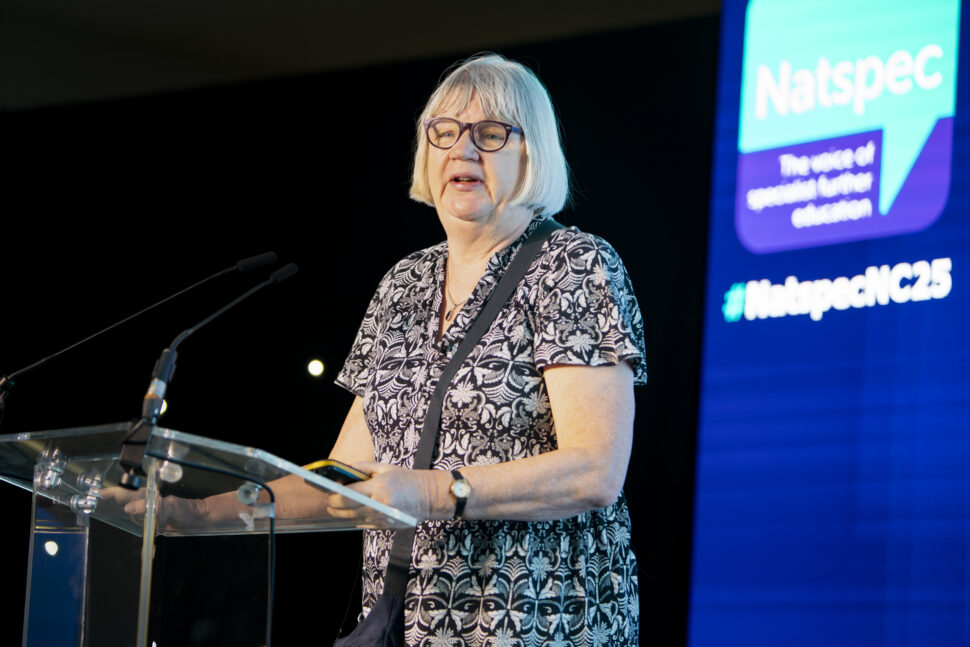Outgoing Further Education Commissioner Shelagh Legrave has warned college governors to be wary of “hero principals” and “dominant chairs”.
In one of her final conference appearances before her term comes to an end in October, Legrave told delegates at Natspec’s annual conference this week she was “still seeing” boards of college governors “surprised” when their institutions run into significant financial or quality troubles.
Legrave’s keynote address on day two of the conference covered what she saw as key governance challenges facing colleges and came in the wake of her damning report into significant governance failures at Weston College earlier this year which saw £2.5 million in payments go undeclared to its former principal Paul Phillips.
“You need to have transparency between your boards and your senior executives,” she said. “I still deal with colleges who run out of money, or who receive an ‘inadequate’, very occasionally, when it was a surprise to the governors. They haven’t asked the right questions, and you need to have the right board expertise”.
The commissioner restated her previous warning that governors spending too long as members of college boards can also be major risks.
“I often talk to people who say, ‘why is it that terms are limited to normally terms of four years for board members?’ If you have served on the same board for 25 years, you’ve got a too cozy relationship, so don’t go there”.
She added: “Don’t have a dominant chair who doesn’t give you the opportunity to ask any questions. Don’t have a hero principal who does whatever they like and then you find that perhaps they’ve done something they shouldn’t have done”.
A major financial risk for specialist colleges is late payments from local authorities, with most colleges receiving funding from multiple sources. Lynette Barrett, CEO of National Star College and chair of Natspec, asked Legrave what the government could do to address the problem.
Legrave agreed that “some local authorities are more efficient than others… we need to work with the Department and link with the Ministry for Housing, Communities and Local Government”.
She added: “It’s ridiculous that if you work with 48 local authorities [like National Star] they’ve all got different [funding] approaches. I’m really with standardising this stuff”.
White papers to give answers on EHCP and post-16 plans
The government’s SEND adviser has called on specialist college leaders to “respond vigorously” to two government white papers featuring post-16 reforms amid mounting speculation over the future of education, health and care plans (EHCPs).
Dame Christine Lenehan told the Natspec annual conference that Labour’s “intended approach” to SEND reform will be set out in a schools white paper in the autumn.
But the sector is also expecting a separate white paper on post-16 education and skills, expected as soon as July, leaving specialist college leaders concerned that 16-25 SEND provision could fall through the net.
Lenehan said the “evidence-based reforms” will be “about trying to move away from a system at the moment that is incredibly angry, into a system where we can collaborate and where everyone does not feel like they are fighting to get the support children and families need”.
The government’s starting point is that post-16 institutions “tend to do inclusion better than schools” and there “should” be a role for specialist colleges in supporting mainstream settings to be more inclusive.
Natspec chair Lynette Barrett asked Lenehan if there were any guarantees over the future of EHCPs for post-19 students. This comes as FE Week’s sister paper Schools Week revealed last month that officials were considering options that could reduce the number of EHCPs. There is also speculation that the EHCP system could be scrapped altogether.
Lenehan told the conference EHCPs were “the most challenging aspect” of SEND reform.
“We’re looking at an EHCP system that uses so much resource that actually we don’t have the educational psychologists and speech and language therapists to work with children because they’re filling in the EHCPs, and where schools are telling us whatever the EHCP says, that’s not how they run the curriculum,” she said.
“In terms of post-19 in particular, government has to look at the whole age span. Some form of statutory planning process will remain, but that has not yet been agreed.”
Lenehan urged delegates to “respond vigorously” to the white papers on post-16 and schools if “any parts you do not feel have addressed your particular needs”.

















Your thoughts